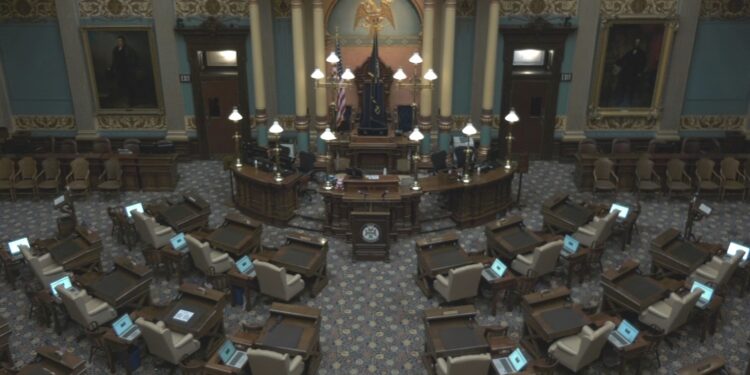LANSING, Mich. (WZMQ) – Early Friday morning, legislation was passed in the house that set a new clean energy standard for Michigan. The Clean Energy Future Plan, and the Clean Energy and Jobs Act both passed down party lines.
The first of the two bill packages passed in the house last night, the Clean Energy and Jobs Act, would set up a system for zoning large-scale solar and wind farms. U.P. Representative Dave Prestin voted ‘No’ on the package, calling it the most aggressive energy package in the United States, and said that since the beginning he felt it was too extreme and would make the U.P.’s baseload of energy unreliable.
Representative Jenn Hill voted in favor of the bills, saying that despite her initial reservations, amendments that she introduced had been added to the package that would provide funding for local communities. She said developers have a real incentive to not take zoning negotiations to the State because they could then be subject to paying the local parties involved up to $150,000, putting locals in the driver’s seat.
Representative Prestin commented, saying Hill’s amendment is one of 67 amendments added to the packages, 20 of which were introduced just before the vote, giving Republicans little time to review them.
Testimony from Republicans on the bills urged legislators not to pass the bills because of the lack of local influence involved, saying they weren’t well thought through, despite amendments that say personal property rights must be prioritized.
The Clean Energy and Jobs Act still has to make its way through the Senate before it can be signed by the Governor. Both representatives proposed amendments to the Clean Energy Future Plan, that were stuck down by the Speaker Pro Temp. The plan, already passed in the Senate, sets a new 100% clean energy goal for 2035. Representative Hill said the state has already reached 15%, back in 2020.
Representative Prestin said he ended up offering amendments originally intended to be introduced by democrats, that would exempt the three RICE burners in Baraga, the three for the Marquette Board of Light and Power, and the seven and Negaunee.
There are currently 13 RICE burners or Reciprocating Internal Combustion Engine power plants in the U.P.. Representative Prestin said the legislation would shut those plants down, which he said would have operated efficiently until 2050, by 2030, which could be detrimental to the U.P.’s power supply. But Representative Hill said the U.P. Made the transition from coal to natural gas in just 5 years, saying Michiganders now have 6 years to prepare for another transition.
Within the New Green Energy Plan, natural gas plants similar to the RICE burners in the U.P. are included within the definition of clean energy so long as carbon capture and storage is used that is at least 90% effective. Representative Prestin said this kind of storage isn’t an option in the U.P. and would double the expenses of RICE burners in the U.P.
Representative Hill said the legislation was written to meet certain goals and ensure federal funding could be secured to assist with the transition, but Representative Prestin said the plan will still end up costing a lot for Michiganders, especially in the U.P..
“The problem, of course, is where do you get the money to afford to make the switch? And that’s why there’s going to be federal incentives to put those [solar panels] on your roof.” Reprsentative Hill said. “We had to make our state stand within those deadlines to qualify for that money. That’s why we had to get this done before the end of the year.”
House Republicans warned that the Democrats money driven motivation could be dangerous and that the legislation would impact the most vulnerable populations, seniors, and those with low or fixed incomes, the most. They also cited concerns that the building of new infrastructure could be wasteful. Most new solar panels have a life of 20 years, and House Republicans said there is no plan for when the technology becomes obsolete.
The Representatives encouraged anyone with concerns to reach out to their legislators and the governor to make their voices heard as the package heads to the Senate. They said they expect the Clean Energy and Jobs Act to be passed in the Senate without many changes if any at all, making both packages ready for a signature from the government as early as the end of next week.










